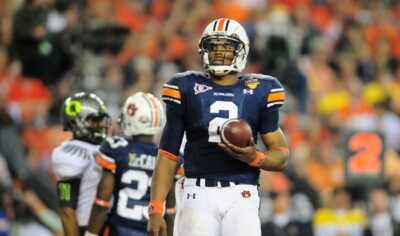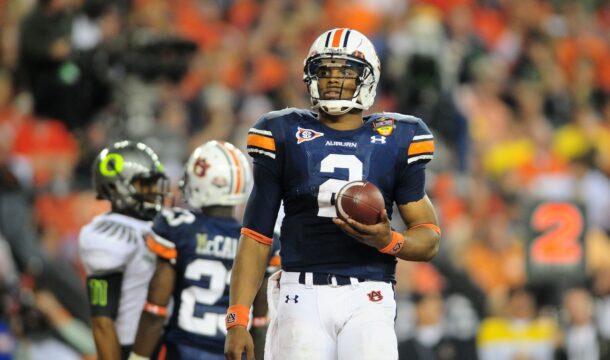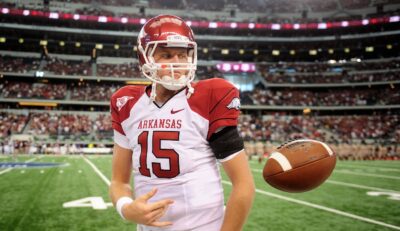
Auburn defensive coordinator Kevin Steele’s toughest task awaits him in 2020
I gained a new appreciation for Auburn’s 2019 defense when I saw it in person against LSU.
The Tigers (the ones in blue and orange) had a formula that nobody else could copy against the eventual-national champions. Kevin Steele rolled out the 3-1-7 defense in an effort to contain Joe Burrow and the high-octane LSU passing offense in Baton Rouge. That same LSU offense that scored more points than anyone in FBS history managed just 23 points all afternoon, which was 13 points fewer than any other 2019 game and less than half of their season average.
Steele’s successful 3-1-7 was supposed to provide the blueprint for the likes of Georgia and Clemson, whose defenses finished the season ranked No. 1 and No. 3, respectively. It didn’t. Why? Well, none of those defenses had a “3” that included players like Derrick Brown and Marlon Davidson. Generating pressure with 3 down linemen makes life easier on everyone. That’s not news, nor is the fact that Brown and Davidson will be playing on Sundays in 2020 after exhausting their eligibility at Auburn.
For the first time since he’s been on The Plains, Steele won’t have that dynamic duo to turn to. Four of the players from Steele’s No. 17 defense were picked in the 2020 NFL Draft, 3 of whom came off the board in the first 47 picks (defensive back Noah Igbinoghene went No. 30 overall). Auburn ranks No. 78 in FBS in percentage of returning defensive production, though I’d argue that Brown and Davidson’s numbers didn’t tell the full story of just how much they made life easier on the rest of Steele’s defense.
What does that mean? This 2020 season will be unlike any challenge that Steele has faced.
If that line prompted you to say “of course this is gonna be like any challenge before Steele because there’s been a pandemic going on, you idiot,” I’d first ask why you feel the need to call me an idiot. That seems unnecessary. But to that point, yes, the pandemic already made this offseason a different kind of challenge for Steele.
If there were ever a year in which coaches wished they had veteran-loaded teams, this is it. That’s not the case for an Auburn defense that returns 5 starters.
Fortunately for Steele, one of those returning starters is K.J. Britt, who deserves a spot on every preseason All-SEC team in existence. He figures to be the leader of the new-look group in 2020 after a season in which he was just behind Brown and Davidson with 10 tackles for loss (no other Auburn player had more than 5.5). Britt is the SEC’s highest-graded run defender returning (Pro Football Focus), but as good as he is, it’s fair to wonder how well he’ll perform without Brown and Davidson taking on multiple offensive linemen.
That’s really the question for Auburn’s entire linebacker group, which is certainly the most experienced area of Steele’s defense. Unlike 2019 when there were 3 new starters at the position, Auburn returns its top 4 linebackers from 2019. In addition to Britt, the likes of Zakoby McClain, Owen Pappoe and Chandler Wooten are all back. That’s the good.
The not-so-good is the consistency replacing Brown and Davidson up front. Seniors Tyrone Truesdell and Big Kat Bryant are expected to take on much bigger roles, though both have fewer than 50 career tackles and have never really broken out in the way that many hoped. It has been flashes like this play from Bryant, where his pressure rushed Mac Jones into a pivotal pick-6 in the Iron Bowl:
Zakoby McClain’s 100 yard pick-six in the Iron Bowl 😱@AuburnTigers | #SECNTakeover pic.twitter.com/MO6hEdBYKX
— SEC Network (@SECNetwork) March 19, 2020
If you’re selling yourself on the Auburn defense in 2020, plays like that probably have something to do with it. And, obviously, there’s the Steele factor.
His ability to adjust is second-to-none. Here’s an amazing thing to think about to show you why Steele is considered one of the best defensive minds in the sport right now.
From 2009-2015, Auburn didn’t have a single top-40 defense. Keep in mind, the Tigers played in multiple BCS National Championships in that stretch and they had strong defensive-minded coaches/coordinators like Gene Chizik and Will Muschamp. Both of those guys were defensive coordinators for top-10 defenses that won national titles (Chizik did so with 2005 Texas and Muschamp did so with 2003 LSU). In the 2 years before Steele arrived, Auburn didn’t even have a top-50 defense.
During the Steele era from 2016-19, however, Auburn had a top-20 defense all 4 seasons. Alabama, Iowa, Clemson and Washington are the only other Power 5 programs that can claim that. Steele’s defense has been the backbone during a time when, let’s be honest, Gus Malzahn’s offense has been a total roller coaster. While Bo Nix struggled with consistency as a true freshman, the defense allowed Auburn to hang around against top-10 teams like Florida, Georgia, LSU and Oregon, which scored an average of 22.5 points in those contests.
That 2019 Auburn defense was built to do the heavy lifting, and that wasn’t always good enough. I have my doubts that the 2020 Auburn offense will improve, and part of that is based on the simple unknown of the post-Brown/Davidson era to consistently make plays and provide short fields to work with (Auburn’s offense was No. 28 in scoring and No. 64 in total yards).
Late last season, there was talk that this was the Tigers’ best defense since that unbeaten 2004 squad. This season, the talk feels more centered around whether this will be Auburn’s worst group under Steele.
Then again, maybe at this point we should just trust Steele to figure it out.
After all, he had 4 defensive players drafted in 2017 and he followed that up by leading a No. 12 defense who helped Auburn win an SEC West title. Despite dealing with an offense that couldn’t sustain drives and averaged just 22.3 points in SEC play, Steele still managed to lead the No. 14 defense in 2018. You can basically copy and paste that sentence for 2019, too.
There’s a reason Auburn made Steele the highest-paid defensive coordinator in America after the 2019 season. It’s so that he can take a challenge like this one and turn it into another notch on his ever-growing belt.
And if he does that, well, maybe this should be the last time I question a Steele-coached defense.
Connor O'Gara is the senior national columnist for Saturday Down South. He's a member of the Football Writers Association of America. After spending his entire life living in B1G country, he moved to the South in 2015.







